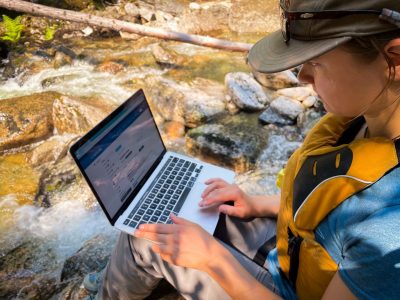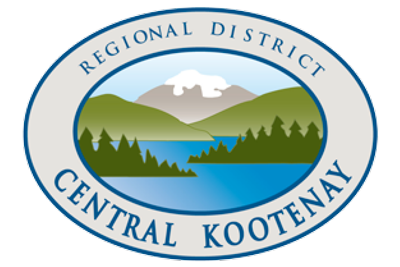Through the Columbia Basin Water Hub, water data is made readily available to those who need to access it. Given the mounting pressures on fresh water, water data is critical for decision making, not only for human and industrial uses, but also for functioning ecosystems.
The Water Hub contains numerical and spatial data, reports, photos and other types of information about streams, lakes, wetlands, groundwater, snow, glaciers and climate in the Columbia Basin both historical and current. The data is accessible to decision makers for Indigenous and non-Indigenous communities, researchers, community volunteers, students, professionals and the public wanting to learn more about their watershed.
Available resources include water quality and temperature data, hydrometric data, Foreshore Integrated Management Planning spatial data and reports, geotechnical assessments, conservation recommendations, wildlife surveys and more.
The database continues to grow as organizations, governments, consultants and industry contribute their data. Having a centralized regional database means that data that has been collected by a variety of parties can easily be accessed and compared. This facilitates increased collaboration and reduction of duplicated effort as groups are more aware of parallel monitoring activities occurring in their regional and local watersheds of interest.
The database is user friendly and adheres to FAIR principles (Findable, Accessible, Interoperable and Reusable). Templates are provided to user groups to ensure that the data is provided in a consistent format.
The Water Hub is supporting data-driven decision making in the Columbia Basin, contributing to a holistic and transparent approach to watershed management.
RECENT UPDATE
Bringing Watershed Data to Life with New Visualization Tool
Volume 1, Issue 3: November 2024
In response to user feedback, the Columbia Basin Water Hub has launched an entry-level data visualization tool to better serve the data community. With this interactive tool, users can more easily understand the data they collect, spot preliminary trends, and effectively communicate findings with wider audiences, especially those without a scientific background.
In the third issue of Watershed Bulletin, explore these new visualization capabilities using data from three water monitoring stations within the Columbia Basin Water Monitoring Framework—Bonanza Creek, Dunbar Creek, and Bruce Creek—and learn about the important role of regional water hubs. View the report.
BACKGROUND
In late 2017, Living Lakes Canada facilitated a conference regarding the logistics needed to fill the important water data gaps identified in the Columbia Basin in a 2017 report. The development of the open source Columbia Basin Water Hub and affiliated Columbia Basin Water Monitoring Framework were initiated to coordinate a collaborative approach to water data collection, analysis, sharing and storage in the Columbia Basin. This involved volunteer and paid steering committee members, various agencies, industry, academia and community organizations with the participation and collaboration of First Nations. It was recognized that much of the data collected by water stewardship groups within the Columbia Basin was at risk of being lost, as it was stored on private devices and even paper records, making it inaccessible and vulnerable. The aim of the Water Hub was to preserve and centralize this valuable information.
The CKAN platform was chosen for the database, and a web developer was contracted to deploy the site and incorporate custom features which were identified through the guiding reports and during the consultation process. Iterative testing of the database with different user groups from around the Basin was undertaken, and QA/QC procedures were developed.
The Columbia Basin Water Hub officially launched to the public in March 2021.
(Pilot implementation of the Columbia Basin Water Monitoring Framework was completed in 2022 - see the CBWMF project page).
SHARING DATA
Data can be submitted by community-based monitoring groups, by municipal, regional or First Nations governments, the private sector, or academia. Data can also be linked to existing databases. This provides an excellent platform for those who have collected data to share their work, allowing it to be accessed and used for decision making.
The data sharing process has helped numerous stewardship groups to organize their records, standardize their data management practices, and showcase their data. The Water Hub recognizes the capacity and resources needed to participate in data sharing initiatives. We are committed to supporting both new and existing contributors, meeting them wherever they are in their data management journey. Through a personalized, one-on-one support model, our team offers assistance with organizing, formatting and publishing data, while collaborating to understand and achieve each contributor’s unique data goals. Click here to learn more about the groups that are currently contributing data to the Water Hub and explore the resources that they have shared.
The Water Hub’s platform supports data governance, allowing users to add, modify or remove their own data at any time, and determine whether their data is available publicly, or only to designated individuals. Data sharing agreements are customizable, allowing contributors to determine how they would like their data to be shared. Through these methods, the Water Hub strives to adhere to the First Nations Principles of OCAP® and our data sharing process can be adjusted to reflect the values and needs of each contributor.
“Data” is not limited to spreadsheets of numerical data. Our database can also display reports, photos, videos, spatial files, information related to place-based Indigenous knowledge systems, external links and more.
If your organization is interested in sharing data or resources with the Water Hub, please contact us. Our database team is available to assist with every step of the process, and has created many resources to make the process simple.
APPLICATIONS OF THE WATER HUB
The data hosted by the Columbia Basin Water Hub can be used in a variety of applications.
The Water Hub is a valuable tool to support the implementation of a coordinated water monitoring network across the Basin being led by the Columbia Basin Water Monitoring Framework. Conducting a data gap analysis using the data that is currently available through the Water Hub will help to identify monitoring needs as part of the development of the Priority Monitoring Matrix. The Water Hub is the repository for the data that is collected by the Framework, which will be used to support climate adaptation and watershed stewardship.
One recent example of how Water Hub data is being utilized include the Pacific Salmon Foundation’s extraction of water temperature data for their province-wide salmon model. This data is essential as water temperature plays a vital role in salmon spawning and survival.
The data can also be used to inform Official Community Plans, regulations, restoration projects, the creation of water quality objectives or climate adaptation and mitigation activities.
Hydrometric data is critical in assessing the availability and timing of flows, and the subsequent development of water budgets for streams and rivers which communities, industry and ecosystems rely on.
The Water Hub has a robust API, allowing users to gather, manipulate, and analyze the data programmatically. This functionality enables seamless integration with various software and tools, enhancing the usability of the data for diverse applications. Additionally, the Water Hub has been integrated into other data repositories, broadening its reach and impact. Water Hub data has been utilized to inform and improve models with the potential to support a wide range of water management and climate adaptation initiatives, and is a trusted resource for decision makers.
CONTACT
Direct questions about the Columbia Basin Water Hub to Maggie Finkle-Aucoin, GIS and Database Manager - maggie@livinglakescanada.ca.
See Maggie's profile.
OCAP® is a registered trademark of the First Nations Information Governance Centre (FNIGC).

News and Updates
How CKAN supports community-based water monitoring in Canada’s Columbia Basin Watershed – Link Digital, Sept 3 2025
Collecting Data From Alpine Peaks to Valley Streams – Alpine Club of Canada, May 23 2025
Watershed data comes to life with new tool – E-KNOW.ca, Nov 22 2024
Enhancing data visualisation: implementing a customised graphing extension for the Columbia Basin Water Hub – Link Digital, Oct 28 2024
From Streams to Stories: Niagara College students visualize water data – Water Canada Magazine, May 30 2024
Resources
- Environmental Data Solutions for Communities - Partnership with Link Digital
- Columbia Basin Water Hub: Full-length Report
- Columbia Basin Water Hub: Executive Summary
- Columbia Basin Water Hub Data Sharing Info Sheet
- Local Data for Local Climate Action: Online Panel Discussion
- Knowing Water Symposium 2024-A Pathway to Accessible and Available Data - Paige Thurston








